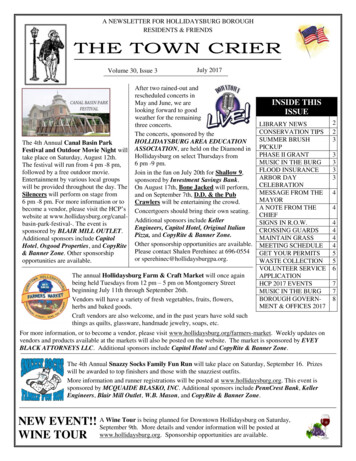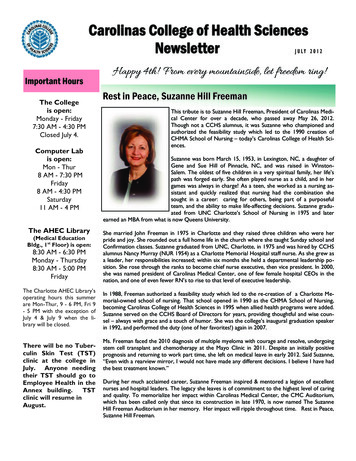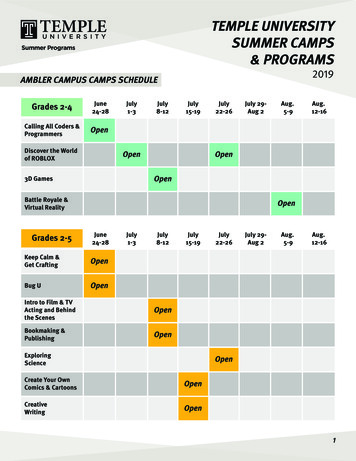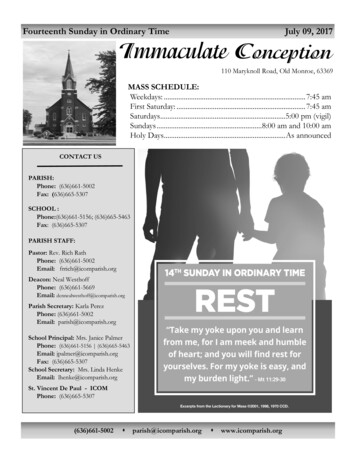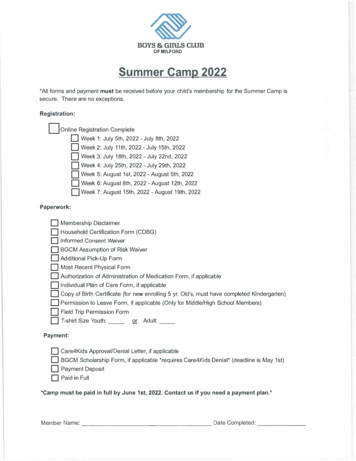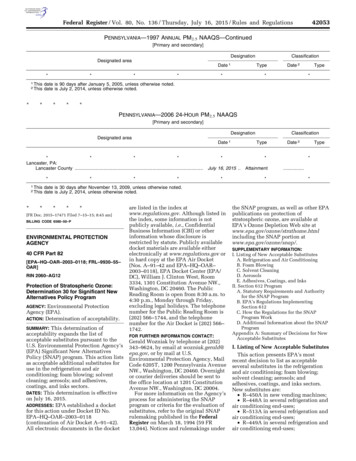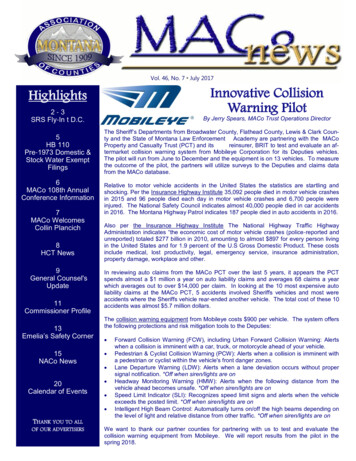
Transcription
Vol. 46, No. 7 July 2017Innovative CollisionWarning PilotHighlights2-3SRS Fly-In t D.C.5HB 110Pre-1973 Domestic &Stock Water ExemptFilings6MACo 108th AnnualConference Information7MACo WelcomesCollin Plancich8HCT News9General Counsel'sUpdate11Commissioner Profile13Emelia’s Safety CornerBy Jerry Spears, MACo Trust Operations DirectorThe Sheriff’s Departments from Broadwater County, Flathead County, Lewis & Clark County and the State of Montana Law Enforcement Academy are partnering with the MACoProperty and Casualty Trust (PCT) and itsreinsurer, BRIT to test and evaluate an aftermarket collision warning system from Mobileye Corporation for its Deputies vehicles.The pilot will run from June to December and the equipment is on 13 vehicles. To measurethe outcome of the pilot, the partners will utilize surveys to the Deputies and claims datafrom the MACo database.Relative to motor vehicle accidents in the United States the statistics are startling andshocking. Per the Insurance Highway Institute 35,092 people died in motor vehicle crashesin 2015 and 96 people died each day in motor vehicle crashes and 6,700 people wereinjured. The National Safety Council indicates almost 40,000 people died in car accidentsin 2016. The Montana Highway Patrol indicates 187 people died in auto accidents in 2016.Also per the Insurance Highway Institute The National Highway Traffic HighwayAdministration indicates “the economic cost of motor vehicle crashes (police-reported andunreported) totaled 277 billion in 2010, amounting to almost 897 for every person livingin the United States and for 1.9 percent of the U.S Gross Domestic Product. These costsinclude medical, lost productivity, legal, emergency service, insurance administration,property damage, workplace and other.In reviewing auto claims from the MACo PCT over the last 5 years, it appears the PCTspends almost a 1 million a year on auto liability claims and averages 68 claims a yearwhich averages out to over 14,000 per claim. In looking at the 10 most expensive autoliability claims at the MACo PCT, 5 accidents involved Sheriffs vehicles and most wereaccidents where the Sheriffs vehicle rear-ended another vehicle. The total cost of these 10accidents was almost 5.7 million dollars.The collision warning equipment from Mobileye costs 900 per vehicle. The system offersthe following protections and risk mitigation tools to the Deputies: 15NACo News 20Calendar of Events Forward Collision Warning (FCW), including Urban Forward Collision Warning: Alertswhen a collision is imminent with a car, truck, or motorcycle ahead of your vehicle.Pedestrian & Cyclist Collision Warning (PCW): Alerts when a collision is imminent witha pedestrian or cyclist within the vehicle's front danger zones.Lane Departure Warning (LDW): Alerts when a lane deviation occurs without propersignal notification. *Off when siren/lights are onHeadway Monitoring Warning (HMW): Alerts when the following distance from thevehicle ahead becomes unsafe. *Off when siren/lights are onSpeed Limit Indicator (SLI): Recognizes speed limit signs and alerts when the vehicleexceeds the posted limit. *Off when siren/lights are onIntelligent High Beam Control: Automatically turns on/off the high beams depending onthe level of light and relative distance from other traffic. *Off when siren/lights are onTHANK YOU TO ALLWe want to thank our partner counties for partnering with us to test and evaluate thecollision warning equipment from Mobileye. We will report results from the pilot in thespring 2018.MACo News Volume 46, Number 7 July 20171OF OUR ADVERTISERS
MACo NewsSRS FLY-IN TO D.C.By Michael J. McGinley, Beaverhead County CommissionerOn April 3, 4, and 5, 2017, the National Forest & Schools Coalition organized a “fly-in” for the purpose ofsecuring the SRS Payments for two years. I was honored to represent Montana and Beaverhead County.The team consisted of six Commissioners and four School Superintendents from Montana, Washington,California, Nevada, Utah and Bob Canavan, Executive Director of the National Coalition.Tuesday morning we all met at the NEA Building (National Education Association) for introductions and gameplan organization. Wes McCart (Commissioner from Stevens County, California) and I then went to NACooffices to meet with Matt Chase and Debra Cox and let them know the game plan and asked for any advicethey may have. After a quick lunch, we were off to Senator Wyden’s (Oregon) office. We met with ErinFauerbach, Natural Resource staffer for the Senator and had a very good conversation about the importanceof SRS. She explained the Wyden/Hatch bill and their commitment to county payments.Next stop was to Senator Cochran (Mississippi) Chair of Appropriations. His advice was to push the HouseMembers hard; as his perception is that the concern of Commissioners on SRS is becoming less important.After this, we were off to Senator Risch’s (Idaho) office for another good conversation. We finished the dayby stopping at Senator Feinstein’s (California) office to discuss their commitment on SRS. What an experience for a Commissioner from Beaverhead County, Montana to be in Senator Feinstein’s office!On Wednesday morning, I went to the Montana coffee. I actually had a great conversation with Senator Tester since we were the first two to show up for coffee. He had me go to his office and met with Henry Ring,SRS and Public Lands Staffer, and also with Justin Folsom, Transportation Staffer. I also stressed with Senator Daines, the importance of SRS being included in the April 28th date of the next C.R. (Continuing Resolution) to keep the Federal Government open. I went to Daine’s office and met with Davin Thacker and JoeSchmoll, Transportation Staffer.I left an information packet with both of the Senator’s Transportation staffers, on the over-regulation andwaste from Western Federal Highways regarding managing FLAP Grants. It appears they could easily fundSRS just on the savings from the waste and inefficiencies coming from Western Federal Highways.I then rejoined the group for a meeting with Senator Murray (Washington). Once again, I heard that theHouse Members needed to hear from Commissioners and School Superintendents on the importance ofSRS.On Wednesday afternoon, I went back to the NACo office to meet with Debra Cox to suggest an email blastbe sent to all counties asking them to talk with their Congressional members while they were home for Easterbreak. This is the email that Shantil shared on April 7th from NACo. Once again, I want to thank the NACostaff on their dedication to counties and their timely and professional work on putting together this April 7themail blast.I finished the day by meeting in Senator Murkowski’s (Alaska) office. Senator Murkowski chairs the SenateEnergy and Natural Resource Committee which is where any SRS legislation would come from.The plan for Thursday was to split into pairs and get into as many House offices as possible. My first meetingwas with the House Natural Resources Committee. Chris Marklund, former Public Lands Staff from NACo,now works for this committee and we all know that he is well aware of the PILT and SRS. Chris suggestedthat we also speak with Representative Westerman (Arkansas) who is a Forester and Vice Chair of FederalLand Committee. Representative Westerman’s Public Lands Staffer (Jonathan Shuffield) has been hired byNACo to replace Chris. I do believe, pursuant to this conversation, that NACo has hired a great person to replace Chris. We will be able to meet Jonathan at WIR later this month.Continued on page 3.2MACo News Volume 46, Number 7 July 2017
MACo NewsSRS FLY-IN TO D.C.By Michael J. McGinley, Beaverhead County CommissionerContinued from page 2.The team went to at least 12 (twelve) other House Member’s offices. I went to the Interior for a meeting withSecretary Zinke’s Intergovernmental Affairs staffer, Tim Williams. This was a great meeting and I was able toexplain the importance of SRS and PILT being fully funded in the President’s budget. I also spoke of Transportation Regulations and the possible savings associated with projects being managed at the county level.Tim claimed that they are working hard and fast, but that we need to realize they would not have all of Zinke’sappointments in place until August. Oh the speed of D.C.!!We finished our day with the Forest Service over at the Ag Building. We met with a Trump appointee, RobinWhitney (Congressional Liaison), and Katherine Bentz (Forest Service Employee) who was promoted fromthe Missoula office.We finished with a debriefing at dinner and all headed for home on Friday.I would like to thank Carol Brooker who helped set up this “fly-in” but was unable to go at the last minute.Once again, I thank the Montana Coalition for the opportunity to represent Montana and to remember to always fight for payments to counties.I came home a little more optimistic about the future of SRS and Forest Management .and almost an experton UBER!MACo Conferences2017 Annual ConferenceSeptember 17-21Best Western Plus GranTree Inn, Bozeman2017 Elected Official OrientationDecember 4-7 (Phase II)MACo Conference Room, Helena2018 Midwinter ConferenceFebruary 12-15Red Lion Hotel & Convention Center, Billings2018 Annual ConferenceSeptember 16-20Holiday Inn Missoula Downtown, MissoulaMACo News Volume 46, Number 7 July 20173
MACo NewsKelsey Grant from Terry High School, recipient of the 500.00 President’s Scholarship, accompanies MACoPresident Todd Devlin and the MACo Board members at the MACo Board luncheon to celebrate herscholastic achievements.Congratulations to Kelsey!!4MACo News Volume 46, Number 7 July 2017
MACo NewsHB 110Pre-1973 Domestic and Stock Water Exempt FilingsBy Tara DePuy, MACo Land Use AttorneyEvery landowner in Montana is receiving a notice that if they have a pre-July 1, 1973 domestic groundwaterwell or developed spring or a pre-July 1, 1973 stock water from surface water, they have the opportunity to fileon these uses. In the Montana water right adjudication a landowner was not required to file on these types ofwater use by June 30, 1983, and many did not. And you do not have to file on these types of water use now.Many landowners receive water from a municipality or water district and HB 110 does not apply to them.The advantage of filing is that the exempt well/developed spring or stock water surface use will be granted apriority date of when the water was first put to use. If you don’t file, your exempt well/developed spring is behind every other water right or exempt well/developed spring in seniority; meaning that if there was a call onthe water in your area you probably will be one of the first to have your water use shut off.The best way to determine if you need to file, it to first go to the DNRC website and pull what water rights arein your name: http://wrqs.dnrc.mt.gov/. Compare what water rights are in your name to your actual domesticand stock water use.If you have a well/developed spring you use for domestic purposes, including lawn and garden irrigation, andyou don’t have a filed exempt well/developed spring with DNRC, you need to determine when the well/developed spring was first put to use. You can rely on well drilling reports, a water right decree from a court,or any other information such as affidavits from current/previous owners that proves the well/developed springor surface water was put to use pre-July 1, 1973.For a surface water use for stock, you will also need to obtain proof as to when livestock first used the surfacewater. Water right decrees from a court and other information such as affidavits from current/previous ownerscan be used to show the surface water was used for stock watering pre-July 1, 1973.MACo News Volume 46, Number 7 July 20175
MACo NewsGALLATIN COUNTY HOSTS THEMACo 108th Annual ConferenceSeptember 17 - 21, 2017- Online registration begins July 3rd It’s time to register for MACo’s 108th Annual Conference which will be held at theBest Western Plus GranTree Inn, 1325 N. 7th Ave., Bozeman406-587-5261Please register to help us better estimate attendanceOnline registration ends September 11thGo to: www.mtcounties.org to register* Registration will be available at the door for an additional fee *If you have any questions or need any additional information,please contact Karen Houston, MACo Meeting Planner at:406-449-4360 or khouston@mtcounties.org6MACo News Volume 46, Number 7 July 2017
MACo NewsMACo WelcomesCollin PlancichA new member ofthe familyCollin joined the MACo familyJune 15th, 2017 as the newFacilities Director.Collin has worked at Barrett Hospital for the pastthree years as an ER Technician. He moved toHelena so can attend nursing school at HelenaCollege.His hobbies are rock climbing, backcountry skiing,fly fishing, horses, and hunting.He plans on making Helena his home and looksforward to working at MACoMACo News Volume 46, Number 7 July 20177
MACo HCT NewsIT’S ALL ABOUT TRUST8MACo News Volume 46, Number 7 July 2017
MACo HCT NewsGeneral Counsel’s UpdatesBy McKenzie McCarthy, MACo Associate General CounselThe “Equal Opportunity” JerkOne of the questions Brian asked me when I interviewed for my new position as Associate General Counsel was, “Whatwould be the first subject you would teach for a training session?” I didn’t hesitate and answered, “Discrimination!” It’sone of my favorite employment things to talk about, so when he asked me to write the newsletter article this month, itseemed an obvious topic choice.There is no place for discrimination in a workplace that values diversity and respect. Everyone has the right to work in anenvironment that is free from discrimination. Plus, it’s against the law. However, before a person can understand how toprevent discrimination and, thus, prevent lawsuits, one must understand what it is.The Montana Human Rights Bureau (HRB) and the Equal Employment Opportunity Commission (EEOC) are theagencies that enforce laws prohibiting employment discrimination. A person I used to work with used the label ‘equalopportunity’ jerk -- a person who would harass employees or treat them unfairly regardless of whether the employee wasmale or female, young or old, Catholic or Atheist -- you get the picture. While this type of behavior is unprofessional andlikely in violation of your personnel policies, it is not illegal (at least under employment discrimination laws).In order for this type of behavior to be discrimination or rise to the level of a hostile work environment, the action takenagainst someone, or the harassing behavior, must be based on the person’s protected class status. The protectedclasses, under Montana and federal law, are: ReligionCreedAgeRaceColorGeneticsNational originMarital statusPolitical beliefDisabilitySex, which includes pregnancy, maternity, and sexual orientationRetaliationThe following actions are illegal, if based on one of the above protected classes: discharge, refusal to hire, denial of maternity leave or failure to reinstate following maternity leave, denial of reasonable accommodation, or unequal compensation or treatment in any other aspect of employment (work assignments, performance measures, work environment, jobtraining, benefits, etc.)Employment laws prohibit employers from retaliating against employees who file charges of discrimination, participate ina discrimination proceeding, or otherwise oppose an unlawful employment practice. A claim for retaliation can be proveneven if the original claim of discrimination fails. This makes it a claim of choice -- retaliation made up 46% of all EEOCclaims and 38% of all HRB claims filed in 2016.As an employer, the key to defending any type of discrimination case is good documentation. Documentation will usuallysupport any action you take, if it’s based on a legitimate business reason and not a discriminatory reason. Keep recordsof any problems and make sure to follow disciplinary procedures. Then, if adverse action is taken against an employee,there is a documented record establishing the reason for the action. And call anytime you need help!MACo News Volume 46, Number 7 July 20179
MACo HCT News2017 DIRECTORY OFMONTANACOUNTY OFFICIALSNOW AVAILABLEThe 2017 edition of the Directory of Montana County Officialsis now availableThis little book is a MUST HAVE!There are significant changes and updates in this years directoryYou may order your directory by going to our website:www.mtcounties.orgPrice remains the same at 15.0010MACo News Volume 46, Number 7 July 2017
MACo NewsCommissionerProfileThe job you wanted at age 18: Mercy Flight NurseJoette WoodsLiberty CountyPerson(s) who had the biggest influence on you/your life, and why: Anyone who has encouragedme, and does not impede my ability to succeed.Favorite movie: Any movie with Steven Seagal in itSpouse’s name and timetogether:Bo Woods—20Years in SeptemberChildren’s names and ages: (5 children): Brooke18, Caden-16, Zebb-13, Bridger-9, Shane-6Occupation and years at current occupation:Liberty County Commissioner, and going on 14years as an EMTProfession before current occupation:Stay at home mom, farm handEducation: High School—Also, 2 years generalstudies at MSU-NorthernBiggest challenge you’ve ever faced: Learningnot to take on other people’s offenses and learningto run a county.Two people, alive or not, you would like to havedinner with: My grandfather who survived PearlHarbor, and it would be interesting to visit with BillyGraham.Surprising fact about you: I absolutely love swathing during haying season.Most adventurous thing you’ve ever done:Bringing 5 amazing children into this world, andattempting to shape them into God fearing,respectful human beings.Favorite TV show: “The Blacklist”A turning point in your life: About age 21, when Irealized the world doesn’t owe me anything.A book you've read twice (or more): “The Jungle”by Upton SinclairMACo News Volume 46, Number 7 July 201711
MACo News12MACo News Volume 46, Number 7 July 2017
MACo NewsEmelia’s Safety CornerSafety tip of the MonthStay Healthy at WorkMost of our waking hours are spent in the workplace.So, what we do during those hours can have aprofound impact on our overall health. A positive wellness culture during the workday can contribute tobetter health - physical, mental, and emotional wellbeing for you and your co-workers. Healthy people aremore productive, more constructive and require fewersick days and health associated costs. Health is anintegral part of being safe as well. There is a directcorrelation of healthy employees and a reduction inworkplace injuries.One of our member counties was recently recognizedfor their efforts in promoting a healthy workenvironment. On May 10th at the Park County HealthInsurance Open Enrollment event, Jim Narum, VPNational Business Development of Interactive Health(headquartered in Minneapolis. MN) presented JillAnn Ouellette of Park County Human Resources,Taylaur Nordhagen, MACoHCT Wellness Coordinatorand Shelley Murphy, MACOHCT Area Representativefor Park County with a plaque for “2016 HealthiestCompanies in America”. Park County joins a selectgroup of nationwide employers being recognized le results as part of the Interactive HealthWellness blood draw programs. In turn, Park Countyhas also noted a reduction in workplaceinjuries.Way to go Park County!Both employers and employees can promote ahealthier work environment.Be a Healthy Employee!Don’t let your work environment diminish your healthfor eight hours of the day. Break up your work day. Getup, stretch, and move. Regular movement throughoutthe day will keep your mind and body limber and helpavoid fatigue.Think of ways you can add movement or at leastdecrease the amount of time you are sedentary.Try getting out of your chair more, standing during yourcalls, or alternating your chair with a yoga ball. And ifyou should drive to work, try parking at the far end ofthe lot, taking the stairs, and going the long way to thebathroom and break room.Tips for Employers:Healthy employees work better. As an employer, youcan institute and encourage healthy changes at yourworkplace to create the best environment to promotemental and physical health for your employees.Offer an employee wellness program. Allow for flexible schedules to accommodateemployee fitness routines.Encourage healthy activities like taking the stairsand activity breaks.Aim to select worksites close to public transportation, walking trails, and fitness facilities.Photo from Park County HealthInsurance Open Enrollment EventFrom right to left:Jim Narum, CP National BusinessDevelopment of InteractiveHealth; Jill-Ann Ouellette of ParkCounty Human Resources;Taylaur Nordhagen, MACo HCTWellness Coordinator and ShelleyMurphy, MACo HCT MarketingCoordinatorMACo News Volume 46, Number 7 July 201713
MACo NewsSun, Sand, and CybersecurityBy Thomas F. Duffy, MS-ISAC ChairSchool’s out and the beach and mountains are calling. It is thattime of the year when so many of us pack our bags and hit theopen road or head to the airport for a well-earned vacation. We may be ready to take a break from our normallives, but we still need to be cyber secure while we are enjoying our time off! In this month’s edition, we will exploresome ways to be safe and smart with our devices, Internet usage, and social media while out traveling onvacation.Stop-Think-ShareAlways be careful about how much you post on social media about your vacations before and during your travels.Criminals can and do watch online posts to find people that are on vacation because that means you have left yourhome unattended.Before “checking in” to a location on a social network, consider what else you are sharing – like the informationthat you aren’t home. Consider skipping the “check in” and making your vacation posts after you have gotten back.This is another way people can see you aren’t home. Perhaps this will have the double benefit of letting you takethe time to choose only the best photos to post after your trip is over! At the very least, consider using privacysettings that only let friends see your posts. Additionally, consider turning off GPS and auto-tagging/auto-check infeatures, if you have them enabled.Disable WiFi auto-connect servicesSome devices have an auto-connect feature that will search for and automatically connect to available andaccessible WiFi networks without your interaction. This can allow your device to automatically connect to anunencrypted, public WiFi network, or even one that was set up by a malicious actor to eavesdrop on your browsingand connection activity.If you want to connect to a store or hotel’s network, check with an employee to see what the correct network iscalled, and see if they can provide a network password for a more secure, encrypted network. Always use asecure, encrypted network that requires login credentials if you have the option. In the event that isn’t an option,and you can use your phone as a WiFi hotspot, use that instead to get a more secure connection for anotherdevice that can’t make direct use of the cellular network’s connection.Additionally, make sure you do not choose to “remember this network” or “join this network automatically” once youhave settled on a more trusted network for use during your vacation. If you have these settings switched on for avery generically named network, your device may connect you to a less secure one that happens to have thesame name. Even if you have this turned off, there’s another setting that will automatically connect you to anetwork you have joined before, which can be a problem since your device doesn’t know the difference betweenyour coffee shop’s “Guest” network and a malicious “Guest” network. Turn these settings off so you don’tautomatically connect, and choose to connect only to more trusted, safer WiFi networks.Keep your devices close, and keep them locked when not in use!Whether it’s your laptop, tablet, or smartphone, be sure to keep your device on you or with someone you trust.Never leave a device unattended in an airport, train station, restaurant, hotel lobby or anywhere else in public whiletravelling. There is a common scam that targets people who leave devices sitting next to them. In this scam,another traveler will approach you and ask for help and then lay a newspaper or map down over your device.While you’re distracted answering their question, they are picking up and pocketing your device under the cover ofthe newspaper or map!Set a strong password: Use at least 8 characters in upper and lower case, numbers, and symbolsSet a strong pattern lock: Use at least 7 points and double it back over itself with at least 2 turns14MACo News Volume 46, Number 7 July 2017
MACo NewsJuly 13, 11:00 AM - 12:00 PM MDTStepping Up Network Call:Conducting a Comprehensive ProcessAnalysis for People with MentalIllnesses in JailsNACo WebinarsJuly 6, 12:00 PM - 1:15 PM MDTStepping Up Network Call:Conducting a Comprehensive ProcessAnalysis for People with MentalIllnesses in JailsJoin the Stepping Up partners for the fourth SteppingUp Network Technical Assistance Call. On this call,counties will engage in a facilitated discussion on thefourth question of the “Six Questions” document: HaveWe Conducted a Comprehensive Process Analysisand Inventory of Services? Counties are encouragedto sign on and join the conversation with national experts and county practitioners! Please be sure to participate in or review the June 29 webinar on“Conducting a Comprehensive Process Analysis andInventory of Services” prior to joining the call.Join the Stepping Up partners for the fourth SteppingUp Network Technical Assistance Call. On this call,counties will engage in a facilitated discussion on thefourth question of the “Six Questions” document: HaveWe Conducted a Comprehensive Process Analysisand Inventory of Services? Counties are encouragedto sign on and join the conversation with national experts and county practitioners! Please be sure to participate in or review the June 29 webinar on“Conducting a Comprehensive Process Analysis andInventory of Services” prior to joining the call.July 11, 1:00 PM - 2:00 PM MDTStrengthening Economies in Coal-ReliantCommunities throughBrownfield RedevelopmentTraditionally coal-reliant communities across both Appalachia and the West are exploring innovative revitalization and economic diversification strategies to buildmore resilient economies and develop a renewedsense of “place.” Join us for this interactive webinar toexplore how brownfield redevelopment is serving asan avenue to spark economic investment and development, particularly in communities impacted by thechanging conditions in the coal industry. Brownfieldsare often abandoned, closed or under-used industrialor commercial facilities-- such as a former factory,warehouse or mine land—where the building or redevelopment of property may be complicated by thepresence of a hazardous substance or pollutant. Thiswebinar will discuss best practices in reuse of thesebrownfield sites and technical assistance resourcesavailable from a team of brownfield assistance expertsworking in communities across the country.MACo News Volume 46, Number 7 July 201715
MACo NewsArthur J. Gallagher200 S. Orange Avenue, Suite1350 Orlando, FL 32801(800) 524-0191, Ext. 3512www.ajg.comHouse Panel Gets Down to Business on Flood Insurance PoolsBy Andrew G. Simpson June 15, 2017House lawmakers are weighing seven proposals to renew and reform the federal flood insurance program, an areawhere there is a good amount of bipartisan agreement that something should be done and even on what to do.The House Financial Services Committee, chaired by Rep. Jeb Hensarling (R-Tex.) is meeting today to mark-uplegislation to reauthorize the National Flood Insurance Program (NFIP), which is set to expire on Sept. 30, and to reformthe program that is 24 billion in debt.The mark-up session had originally been scheduled for yesterday but was postponed due to the shooting in Virginia inwhich House Majority Whip Steve Scalise (R-La.) and four other people were injured.In addition to renewing the NFIP, the various proposals aim to put the program on stronger financial footing, removeobstacles to greater private insurer participation in the market, limit payments for properties that flood repeatedly, reducetaxpayer subsidies, provide aid for those unable to afford coverage, improve flood mapping, encourage mitigation effortsand overhaul claims handling.Chairman Hensarling opened the session with a promise to keep taxpayers’ interests at the forefront of the debate.“There are so many important voices in our debate today on the reauthorization of the National Flood InsuranceProgram. Certainly the homeowners who have relied on this program — theirs is a very important voice because we goto their homes and we go to their household finances. Theirs is a very important voice. Homebuilders, they have animportant voice. Insurance agents and companies, local communities — these are all important voices in this debate.But as far as I’m concerned, perhaps the single-most important voice is the voice that remains underrepresented in thedebate and that is the voice of the American taxpayer,” Hensarling said.He said he believes that homeowners should gradually be expected to pay actuarial rates. “They need predictability. Weneed to protect them from sticker shock, but the program must be made sustainable,” he said.Rep. Maxine Waters (D-Calif), the highest ranking Democrat on the committee, said she was disappointed that therehad not been more bipartisan agreement on some of the measures and expressed concern that the package of billsmight actually “make matters worse by restricting coverage, increasing costs, and opening the door to cherry-picking bythe private sector.”Waters also mai
The Sheriff's Departments from Broadwater County, Flathead County, Lewis & Clark Coun-5 HB 110 Pre-1973 Domestic & Stock Water Exempt Filings 6 MACo 108th Annual Conference Information 7 in 2016. The Montana Highway Patrol indicates 187 people died in auto accidents in 2016. MACo Welcomes Collin Plancich 8

